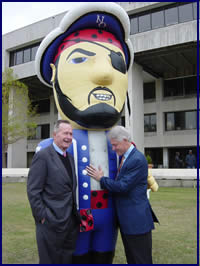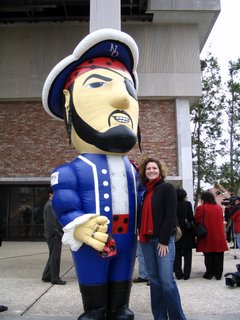

Today I drove to campus for the first time since this summer, when I was teaching one section of freshman composition, when one of my students called me "Miss Chewbacka" because the new Star Wars had just come out, and when Tropical Storm Cindy was the big news, with her 80-mile-per hour winds and 15-hour power outage. (The day after Cindy I drove to get coffee at the only open coffee shop and was charmed by the camaraderie shared in the long line for espresso.) In other words, it was a lifetime ago.
I think I've mentioned before that one of my Uptown friends refers to the dry, and mostly white area of town that hugs the Mississippi River as the "Isle of Denial." One needs only to drive North or East to see what the rest of the city is like. And, in doing so, one realizes why one would rather live one's life solely on The Isle.
I hadn't cried in perhaps a week, maybe longer, but driving my regular commute for the first time since the storm--up Franklin and left at Robert E. Lee to the University--those tears came back, and hard, like I was making up for lost time.
I used to fantasize about buying a house in the neighborhood where Tom and Brandi had just settled in before Katrina. Gentilly was a primarily-black suburb of New Orleans, and its houses were mostly cozy ranches on piers. There was one house I liked, in particular, that was for sale last year. It had a kind of Spanish Bungalow flair to it, with stucco siding and red awnings, but it wasn't in very good shape, and anyway, buying is, for me, a pipe dream with all the debt I've got (I'd better not go there, or I'll start crying anew!)
Now, that house, and most of the houses on my commute, bears the watermark-scar of the flooding that, if one imagines sitting inside (as one would do in a house there--sit inside with family and friends, and eat and share, just as we had sat and eaten and shared in Tom and Brandi's house three weeks before the end of August,) would cover one's head.
I have these images now. It's not "seeing things," exactly; it's something else. It is as if my post-Katrina memories have superimposed themselves on the pre-Katrina ones. Now, when I recall memories of experiences I had in the areas that flooded, it feels like I’m looking at an insect preserved in amber.
I’d been down Franklin before, but now it looks worse. The gutting has begun. The signs have taken over. One that I saw today read, “We Demolish Houses.”
So I cried when I saw the house I once dreamed about owning, and I cried when I passed the intersection of Franklin and Gentilly, where the ridge saved the big houses and patches of green grass appear almost ridiculous, laughable. To have to mow one’s lawn in such a place! I cried when I saw FEMA trailers parked in front yards. I cried when I realized I was on auto-pilot, steering clear of the same potholes, the same sunken slabs of what passes for New Orleans’ streets (oh, to have THAT complaint NOW!) I cried when I saw the Sav-A-Center, where I once made all of my grocieries—how its parking lot has become a staging area for contractors and their equipment. I cried when I saw the once-majestic pecan trees along Robert E. Lee, the ones where I’d often seen old men with brooms banging the branches and collecting nuts in plastic shopping bags—the trees now splintered and nearly-bare (why is it that we always call big Southern trees “majestic”?)
At any rate, it was all one cry, but each of these markers seemed worthy of its own, good mourning.
I shaped up once I saw the signs for “Bush-Clinton Katrina Fund Event Parking.” They seemed so, well, weird, posted there next to signs for home demolition, but there they were.

I parked in the Engineering Building’s parking lot and walked to the quad in front of the library. I’ll admit it: my spirits lifted, pep-rally-style. There was a big, white, event-tent, and the new UNO mascot, “Air Pierre,” was there, bonking around, looking silly.
I approached two English Department colleagues of mine, Gary Richards and Anne Boyd, who both lost their homes. They could see that I’d been crying, and when I explained the “commute,” Gary said, “It doesn’t take much these days, does it. He’d gone to see the movie Rent, which he said, “wasn’t even very good,” and he positively bawled. Anne said she, too, was having crying bouts. What a weepy town we are.
The event was crowded—standing room only, and I stood in the back, next to the ubiquitous UNO-event jazz band and in front of the press. After a 45-minute wait, Presidents Clinton and George H. Bush finally arrived, along with Governor Blanco and the “first ladies” of Mississippi and Alabama. The purpose of the event was to announce the distribution of 90 million of the approximately 100 million the Bush-Clinton Katrina fund has saved. What everyone talked about was how the money came “from all corners of the world,” and they also talked about the importance of education and faith. Not surprisingly, the money was being allotted to higher education and churches. I could do without the faith-based stuff, but whatever.
Afterwards I tried to catch a photo of Clinton, but only got one where he’s a tiny ant. I had to doctor it to even make him visible, but I just wanted to have proof of seeing him. Now sure why, exactly. This is the prick who turned his back on the genocide in Rwanda, after all. But today was about “spirit,” and it was effective, in that sense. I even had my picture taken with “Air Pierre” after hearing from the English chair, Dr. Schock, that my job MIGHT still be mine in the fall.
I feel strange, though, like I don’t have any say in the funds or the future or anything, really. I am still so stressed out that my neck hurts and I clench my jaw. I worry about the future commute, about driving through devastation every day… devastation that is and is not my own. What must that do to a person! What it is doing to me, now!

No comments:
Post a Comment